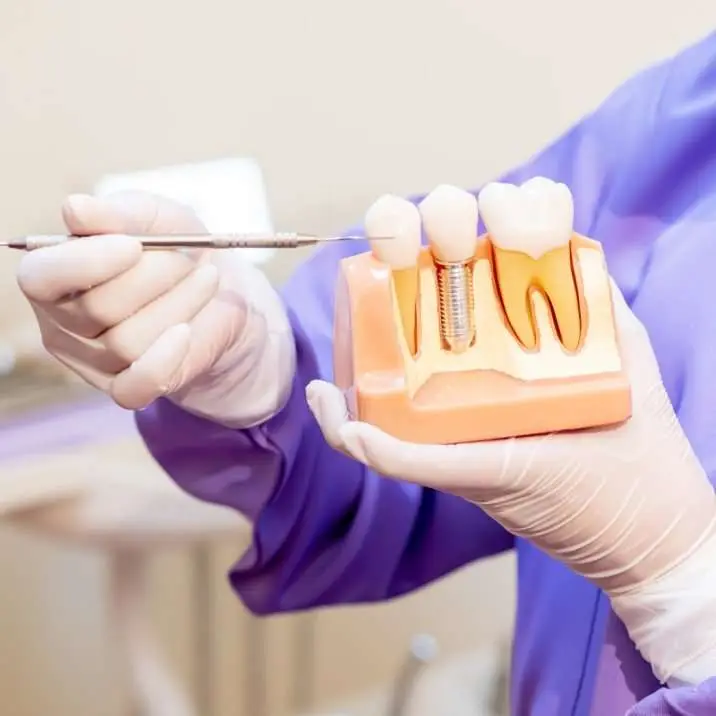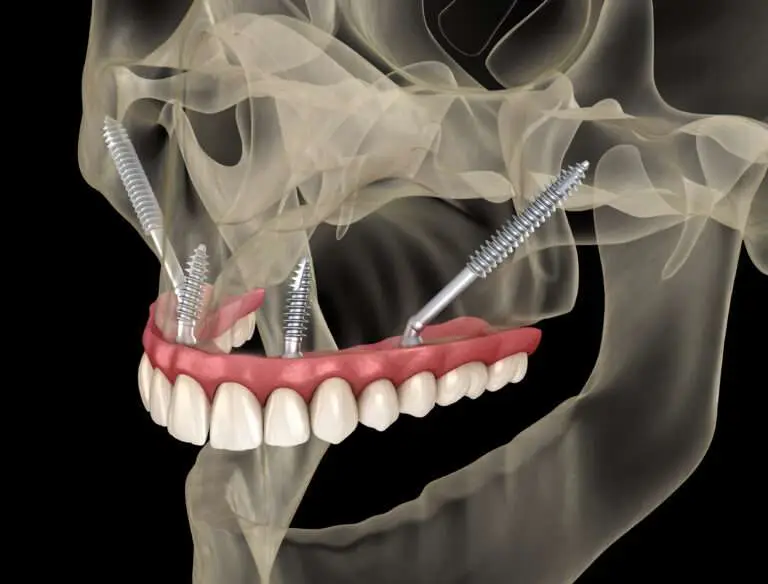Understanding Dental Implants Risks
While complications from dental implant procedures are uncommon with a highly skilled and knowledgeable surgeon, it’s crucial to be aware of the potential dental implant risks to make an informed decision and avoid surprises. Being fully informed about possible complications of teeth implants is vital. Discover more about the risks associated with dental implants below.

Understanding the Risks Associated with Dental Implants
Restoring your smile and natural teeth in the lower or upper jaw involves choosing safe and effective solutions for better function and appearance. Dental implants are a way to replace missing teeth and treat gum disease and bone loss. Understanding how the procedure works and whether it carries any potential complications is important.
An artificial tooth anchored securely by an implant can offer a semblance of normalcy and aesthetics many seek after losing their natural teeth.
The expertise of an oral surgeon is crucial in minimizing the risk of complications with dental implants. Certified experts can help prevent problems or even dental implant failure. That’s why we always recommend choosing one of our Smile24h Expert Clinics. They all work aligned with the ZAGA Philosophy, known for their patient-first approach, minimally invasive techniques, and tailored solutions to address each patient’s needs.
This article discusses important information for patients considering dental implants. It is essential to be well-informed and safe throughout the process. The goal is to restore the beauty and function of natural teeth and regain a confident, worry-free smile.
One key factor to consider before getting dental implants is the patient’s overall health. The patient needs to have good oral health and be free of any underlying medical conditions that could affect the success of the procedure. Additionally, patients should have realistic expectations about the outcome of the implants and understand that the process may take time to complete.
Another important aspect is the recovery period. Patients should prepare for the recovery process after receiving dental implants. This may include some discomfort, swelling, and dietary restrictions while the implants heal. Following the post-operative care instructions provided by the oral surgeon is crucial for a successful outcome.
Finally, discussing the risks associated with dental implants, it’s also critical to consider the financial aspect. Although dental implants represent a considerable investment, their lasting advantages in terms of oral health and aesthetic appeal often justify the cost for many individuals. Before proceeding with the procedure, we recommend discussing the payment plans and insurance coverage with your oral surgeon. This ensures you’re fully informed about the financial commitment involved.
Overall, getting dental implants can be a life-changing experience for many individuals. By being well-informed and prepared for the process, patients can achieve a beautiful smile and improved quality of life while feeling confident throughout the procedure.
Minimal Risks of Dental Implant Treatment
Dental implants are a safe and effective option for replacing missing teeth. They look, feel, and function like natural teeth, providing a great solution. These fake tooth roots blend into your jawbone, helping support the implant and the attached phony tooth.
Similar to other medical procedures, dental implants have risks, such as failure, infection, nerve damage, and sinus problems. Even though there are worries, the risks are low when a skilled dentist oversees the procedure. They ensure the implant integrates well with the bone to support it properly.
Good oral health and proper care before and after dental implants are essential for their success, including their durability and stability in the long term. One common reason implants fail is poor oral hygiene, which can lead to infections and, subsequently, bone loss around the implant site. It’s essential to keep your mouth clean and follow your oral surgeon’s advice to keep your implants healthy. Additionally, smoking is a significant factor that negatively impacts the success and longevity of your dental implants.
Moreover, selecting a dentist with a history of successful dental implant surgeries is crucial to prevent any issues. That is why Smile 24h works exclusively with Certified ZAGA Doctors, recognized as significant experts worldwide in advanced implant dentistry and reconstruction treatments. Find your closest certified ZAGA Center here and ask them about how to care for your dental implants.
Following their advice to keep your mouth healthy, you will ensure the implants won’t give you extra difficulties and maximize the treatment outcome. With good care, most patients have no issues with dental implants. They can enjoy a restored smile and better dental function for years.


What Are the Dental Implants Risks? Potential Complications and How to Reduce Them
- Implant Failure: This occurs when the implant does not properly fuse with the jawbone, a known risk among dental implants risks. However, typically, it is not the end of the road. At Smile 24h, our certified experts frequently assist patients who’ve experienced this disappointment. Despite previous failures, our professionals can still offer you a pathway to restore your fixed dentures successfully.
- Nerve Damage: Advanced imaging technologies allow dental professionals to create a virtual 3D model of the jaw. This precision helps avoid critical structures like nerves, thus minimizing one of the known tooth implant complications.
- After getting teeth implants, infection can happen. You can treat it with antibiotics and a plan to keep your mouth clean and prevent infection. It’s really important to have regular check-ups with your dentist so they can notice and treat the risk of infection as soon as possible.
In addition to implant failure and nerve damage, other potential risks of dental implants include gum recession, sinus problems, and implant rejection. Placing the implant too close to the gum line can cause gum recession, exposing the implant and potentially leading to infection. Sinus problems may arise if the implant protrudes into the sinus cavity during placement. Implant rejection, although rare, can occur if the body’s immune system rejects the implant material.
It is important to choose a skilled and experienced dental surgeon for the implant procedure to prevent or reduce these risks. They will carefully assess your oral health and anatomy to ensure the proper placement of the implant. Following post-operative care instructions, such as maintaining good oral hygiene and attending regular check-ups, can also help prevent complications.
Overall, while there are risks associated with dental implants, the benefits often outweigh them. With proper care and maintenance, dental implants can provide a long-lasting solution for missing teeth and improve overall oral health and well-being.
We encourage patients to ask about the risks and complications of dental implants while we take steps to reduce these risks and make sure patients feel informed and confident about restoring their smiles.






